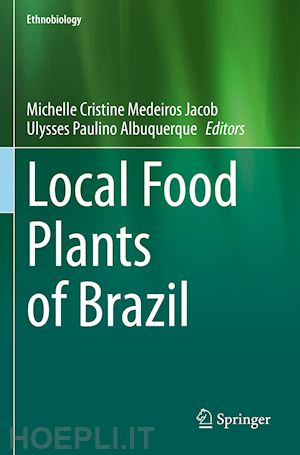Preface
Part 1. Basics on Food Plants and Biodiversity in a Multidisciplinary Approach
Food Biodiversity Key Concepts
Ulysses Paulino Albuquerque
Food Systems towards Food and Nutrition Security: The Food Biodiversity Role
Cecília Rocha
Biodiversity, Cultural Diversity and Food Cultures
Jean-Pierre Poulain
Unconventional Food Plants: Food or Medicine?
Washington Soares Ferreira Júnior
The Potential of Unconventional Food Plants for Improving Diets and Nutrition
Danny Hunter
Part 2. Brazilian Food Plants: An Overview
Brazilian Unconventional Food Plants and National Policies to Strengthen Food and Nutrition Security through Biodiversity
Daniela M. de Oliveira Beltrame
Food Plants from Brazilian Biodiversity as a Source of Bioactive Compounds
Maria das Graças Lins Brandão
Natural Toxins in Brazilian Unconventional Food Plants: A Review
Fillipe Oliveira Pereira
Part 3. Ethnobotanical Knowledge of Brazilian Food Plants
Brazilian Food Plants Reported by Scientific Travelers and Naturalists: Key Plants from the Past to the Future
Maria Franco Trindade Medeiros
Brazilian Food Plants and Indigenous People: Trends in Archaeobotany
Mariana Franco Cassino
Famine Foods: Thoughts from a Caatinga Research Experience
Viviany Teixeira do Nascimento
Part 4. Nutritional Composition Data on Brazilian Food Plants by Biome
Food Plants in Cerrado
Leonardo Luiz Borges
Food Plants in Caatinga
Daline Fernandes de Souza Araújo
Food Plants in Pampas
Mariana Oliveira Ramos
Food Plants in Amazonia
Nilson Evelázio de Souza
Food Plants in Pantanal
Ieda Maria Bortolotto
Food Plants in Atlantic Rainforest
Veridiana Vera de Rosso
Part 5. Consumption of Brazilian Food Plants
Challenges to Assess Sustainable Diets in Nutritional Science: A Case Study in Caatinga Biome
Michelle Jacob
Potential for Popularization of Unconventional Food Plants Based on Local Perception
Patricia Muniz de Medeiros
Potential of Unconventional Food Plants Value Chains
Rafael Ricardo Vasconcelos da Silva
Food Plants of Brazilian's Sociobiodiversity in the National School Feeding Program
Ana Laura Benevenuto de Amorim
Part 6. Learning and Teaching Brazilian Food Plants
E-Learning through Social Networking Sites: A Case Study from Facebook
André Benedito
Plant Identification Using Artificial Intelligence: Innovative Strategies for Teaching Food Biodiversity
Elias Jacob
A Garden Laboratory: Food Biodiversity Research Skills for Nutrition Students
Thiago Perez Jorge
The "PANC na City" and "Horta City Lapa" Experiences: Learning and Teaching on Unconventional Food Plants in the Brazilian Urban Context
Neide Rigo
Food Sovereignty for Lunch: Workshops in an Unconventional Farm
Valdely Kinupp
Index











